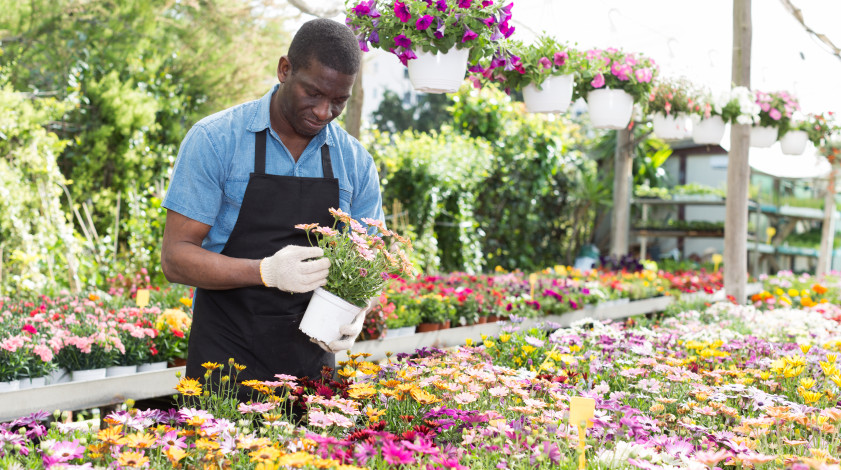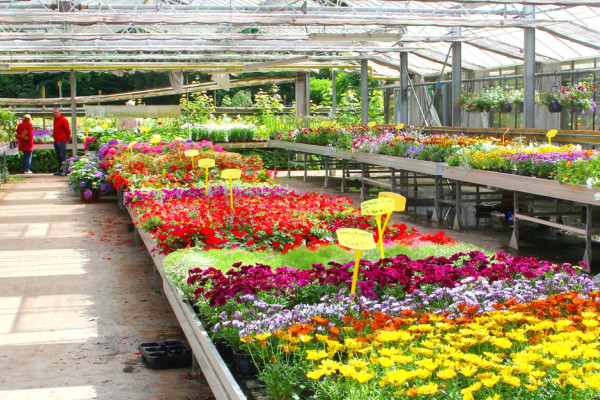

What are the chances of UK floristry making a recovery?
We think they are very good, and all evidence points towards that being the case, but we need to be realistic, too. Things have changed. The effects of the past two years will be long lasting there can be little doubt about that. Lockdowns and the pandemic have affected all walks of life, and floristry is no different. As we collectively emerge from the struggles of the corona years, it seems a timely moment to look at why local florists in the UK, and flower lovers in general, have reasons to be hopeful for the future.
Before we do that, however, we need to take an honest look at how florists and customers were affected by Covid restrictions. First, we need to discuss where we get our cut flowers, and how supply and demand changed due to the pandemic. We will then take a look at what happened both during the lockdowns and when they were lifted. Finally, and most importantly (at least in our eyes) we will cast a hopeful eye toward the future, and talk about how we can make positive changes to increase sustainability and support British businesses.
A glance at where many flowers for sale in the UK come from

Despite romantic notions of flowers sellers in the street selling flowers from the field (perhaps because of George Bernard Shaw’s portrayal of Eliza Doolittle) Floriculture is big business; in fact it is presently worth over £22 billion worldwide, and is projected to grow by more than 5% over the next 7 years. The Netherlands dominates the supply of cut flowers and is home to the largest markets and flower auctions in the world. They don’t grow all of the flowers the supply, importing vast quantities of flowers from countries such as Kenya, Ethiopia and Ecuador amongst others. Most of your Valentine’s roses will be from Kenya.
The distances cut flowers travel may seem like an unsustainable nightmare in these climate conscious times, but looks can be deceiving. As these countries have far better growing conditions than the ones in Northern Europe, environmental impact of flower cultivation there is far less than we can manage with heated greenhouses. Many of the growers and companies in these countries are part of the Fairtrade Foundation, meaning there are real benefits for local communities. Unfortunately, imports from these countries were affected by logistical issues like rising fuel costs and the grounding of flights.
How did lockdowns affect local florists in the UK?

Follow your Dreams (Cancelled) by Banksy: Chinatown, Boston, Massachusetts: 2010
Within the first six weeks of lockdowns beginning in March 2020, the industry in the UK upwards of £100 million. Due to the nature of the industry in the UK, local florists felt the brunt of the losses. Supermarkets have taken a large share of the UK flower market because they offer cheaper bouquets, and whilst they cleared space for essential items they could still operate whilst local florists had to close their doors. As we know by now, Supermarkets and large corporations actually did quite well during the pandemic. Not so independent, local businesses.
Offering same day delivery sets local florists apart, and means they can still provide the personal touch that is so important when ordering flowers for a special occasion, for celebrations like anniversaries or birthday, and more sombre occasions like offering condolence and funeral flowers. However, due to restrictions many special occasions were cancelled or postponed in the summer months, which was another harsh blow for local florists.
You shouldn’t call it a comeback we’ve been here for years

It was inevitable that the industry would rebound after such a difficult 2020, but UK floristry has made a remarkable recovery. The good news is that man y of the local florists throughout the UK didn’t go away, but they did shift their focus. Moving online was always going to have to happen, but before the pandemic it was happening slowly as many artisans struggled to get a grip of the technology. As a result of the difficulties faced, what may have taken 5-10 years, happened in a matter of months.
Flowers are an emotional subject, and there were lots of reasons to get emotional over the past two years. More and more people used flowers as ‘virtual hug’ and to let loved ones know they were thinking of them.
Weddings and special occasions that had been cancelled (not the weddings we hope!) or postponed were back. These occasions allow local florists to shine, and provide the personal service that just isn’t there from supermarkets or large online retailers.
The future of floriculture looks bright
Looking to the future there is a consensus that the impressive growth of the industry will continue in 2022 and beyond. Online flower delivery is growing, and is here to stay as local florists make use of the technology at their fingertips to provide a service that the huge players in the industry just can’t match: same day delivery.

Sustainability is more important than ever. Local florists offering same day delivery in the UK, delivered in water from a local flower shop is obviously more sustainable than long distance flowers that come overnight from a central warehouse. Sourcing British flowers is another way to increase sustainability in the industry, and along with reducing single use plastics is one of a number of strategies being pursued by Flower Shops Network and our local florists.
Working from home become commonplace during the pandemic and is another reason to be hopeful for the future of the floral industry. People have realised that it is feasible, and in many cases preferable, to continue to do so. The need to look after our mental health became obvious during the pandemic and it is a scientific fact that flowers make people feel better, so it stands to reason that more people will buy flowers as they brighten their home workspaces and their mood.

Can we take positives from the pandemic?

During such trying times it is important to look objectively at the situation and see what, if any, benefits we can take, and whilst there have been highs and lows for UK florists it is definitely true that they are better equipped than ever to hold their own in the modern world. In addition to proving their resilience, many skilled artisans have taken the right steps which means they have weathered the storm, and are once again growing in demand.
As mentioned, sustainability is now a major consideration, and not just in floristry. It is vitally important for the world. Offering sustainable flowers for same day delivery in the UK is a point of difference between local florists and larger corporations like supermarkets. It is time to highlight that difference and build on it. Sourcing British flowers is a great way to do that.
The current supply chain works, but it is susceptible to increased fuel prices and flight cancellations, making the origin of flowers more important. Markets and auction houses on the continent have also been badly affected and the increased difficulty of trade with the EU could made it nearly impossible to source flowers for many British florists.

British flowers could well be the sweet smelling answer that is under our nose! We started the entire floriculture industry in the first place. In recent years British growers have been producing some of the rarer flower varieties as they couldn’t compete with the corporate behemoths of the Dutch, and Equatorial growers, but that is changing, too. People want flowers with scent, which are removed to increase yields at the massive operations in those countries. If British growers can keep their high standards and supply the flowers that we normally import there are massive benefits for everyone, and the environment.
British Flowers and local florists will continue to flourish
The outlook is definitely rosy for the future of UK flowers, growers and the world in general, despite the difficulties we have all faced. Flower Shops Network work with independent local florists to provide hand tied flowers for same day delivery and will continue to do so. We have an intimate knowledge of floristry in the UK and have used our knowledge of ecommerce trends to help local florists in the UK to stem the tide of machine cut flowers coming from central warehouses.
We are well aware of the need for increased for increased sustainability, and have begun sourcing British flowers. This is only the first step in a long journey. Our future plans (which have to remain under wraps for the moment!) will bring the artistry back to floristry, and continue to champion local florists and promote British flowers. We got through the pandemic together and now the future looks brighter than ever.
